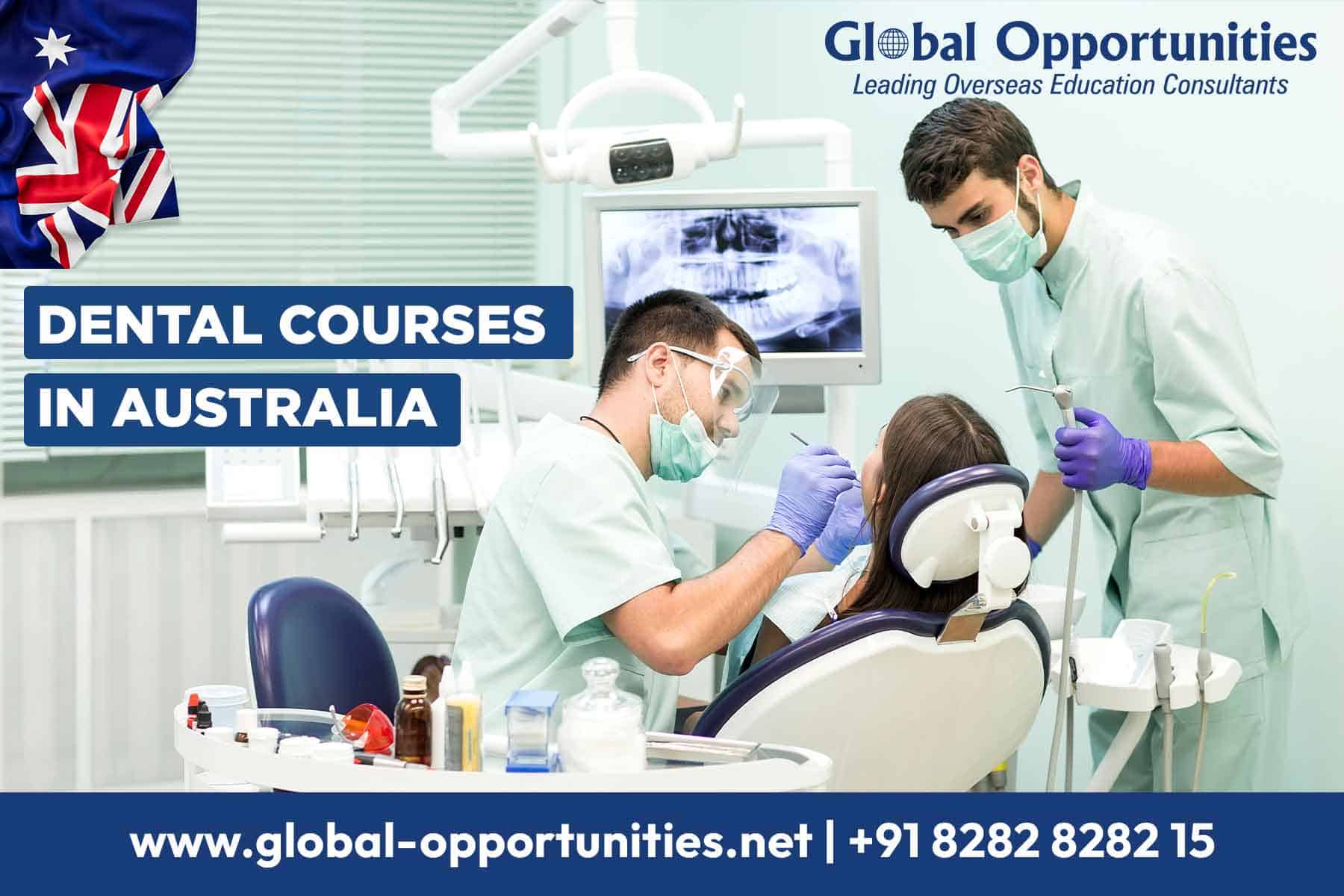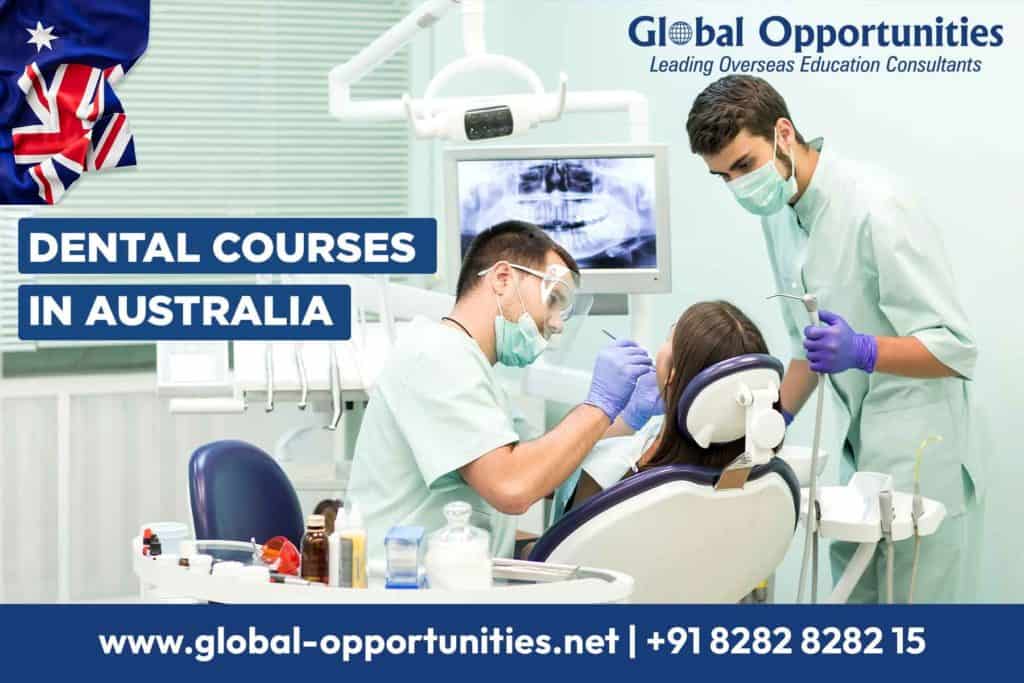Dental Courses in Australia for International Students

 The Australian healthcare industry imports over 85% of its medical products, and the dental industry is predominantly privately funded, meaning that most patients pay for dental care out of pocket.
The Australian healthcare industry imports over 85% of its medical products, and the dental industry is predominantly privately funded, meaning that most patients pay for dental care out of pocket.
There are also a number of Australian universities which offer a variety of dental courses in Australia for international students.
In addition to this, to practice dentistry in Australia, students must have a university degree in dentistry from an accredited institution, be registered with the Dental Board of Australia (DBA), and renew their registration annually.
Top Universities Offering Dental Courses in Australia
| University Name | Degree Name | Location |
| La Trobe University | Bachelor of Dental Science (Honours) | Melbourne |
| Royal Melbourne Institute of Technology | Diploma in Dental Technology | Melbourne, Australia |
| University of Queensland | Bachelor of Dental Science (Honours) | Brisbane, Australia |
| The University of Sydney | Bachelor of Science/ Doctor of Dental Medicine | New South Wales |
| Griffith University | Bachelor of Dental Health Science | Brisbane City |
| University of Western Australia | Doctor of Dental Medicine | Perth |
| James Cook University | Bachelor of Dental Surgery | Townsville, Australia |
| Charles Darwin University | Bachelor of Dental Science | Darwin, Australia |
| Victoria University Melbourne | Doctor of Dental Surgery | Melbourne |
| University of Adelaide | Bachelor of Dental Surgery | Adelaide, Australia |
Advantages of Dental Course in Australia
There are a number of advantages of studying dental courses in Australia for international students. Some of these advantages include:
Globally recognized qualifications
Australian dental qualifications are accredited by the Australian Dental Council (ADC), which is a member of the International Federation of Dental Education (IFDE). This means that your Australian dental qualification will be recognized and accepted in many countries around the world.
Culturally diverse environment
Australia is a multicultural country with a welcoming and inclusive society. International students will feel at home in Australia, and they will have the opportunity to learn from and interact with students from all over the world.
Affordable tuition fees
Tuition fees for dental courses in Australia are relatively affordable compared to other countries, such as the United States and the United Kingdom.
Strong job prospects
The dental industry in Australia is growing rapidly, and there is a strong demand for qualified dentists. Australian dental graduates have a high employment rate, and many go on to have successful careers in both the public and private sectors.
Eligibility of Dental Courses in Australia
The eligibility requirements of Dental Courses in Australia for international students differs from undergraduate to postgraduate degree courses. The eligibility criteria is also different for academics and English language requirements. Some of the core requirements includes:
Academic Requirements:
- Most universities will require international students to have completed a secondary education qualification that is equivalent to the Australian Year 12.
- International students will also need to have completed a number of prerequisite subjects, such as biology, chemistry, and mathematics.
English Language Requirements:
- International students whose first language is not English will need to demonstrate their English language proficiency by meeting the university’s English language requirements. This can be done by taking an English language test, such as the IELTS, TOEFL and PTE.
Challenges to Dental Courses in Australia
Here are some of the challenges that international students may face while studying dental health courses in Australia:
Academic challenges
- Dental health courses in Australia are academically rigorous and require students to have a strong foundation in science and mathematics. International students who have not studied these subjects in their home country may find the academic demands of the course to be challenging.
- International students may also find it difficult to adapt to the Australian education system, which is different from the education systems in many other countries. For example, Australian universities typically have a more independent learning style, and students are expected to be proactive in their studies.
English language challenges
- International students whose first language is not English may find it difficult to understand the lectures and tutorials delivered in English. They may also find it difficult to communicate with their classmates and professors.
- International students may also find it difficult to write academic essays and reports in English. This is because academic writing in English has a specific style and format that can be difficult for non-native speakers to master.
Cultural challenges
- International students may find it difficult to adapt to Australian culture. This is especially true for students who come from countries with very different cultures.
- International students may also find it difficult to make friends with Australian students. This is because Australian students may be less familiar with international students and their cultures.
Financial challenges
- The cost of studying dental health in Australia can be high, especially for international students. International students need to pay for tuition fees, living expenses, and health insurance.
- International students may also find it difficult to find part-time work to help support their studies. This is because there are restrictions on the types of jobs that international students can work in Australia.
Visa challenges:
- International students need to apply for a student visa (subclass 500) to education in Australia. The student visa application process can be complex and time-consuming.
- International students also need to meet certain requirements to maintain their student visa, such as maintaining a certain academic standard and attending a certain number of classes.
Courses in Australia
- Medical Courses in Australia for Indian Students
- MBA Courses in Australia for Indian Students
- PR Courses in Australia for Indian Students
- Trade Courses in Australia to Study Abroad
- Courses in Australia for Indian Students
- Cheapest Nursing Courses in Australia for International Students
Conclusion
Dental courses in Australia are highly regarded and offer students the opportunity to gain a world-class education in dentistry. Graduates from Australian dental schools are in high demand both domestically and internationally.
The Australian Dental Council (ADC) accredits all dental programs in Australia, ensuring that they meet the highest standards of quality. Australian dental schools also have strong research reputations, and students have the opportunity to participate in research projects with leading academics.
Overall, dental courses in Australia offer a number of advantages for students, including high quality education, globally recognized qualifications, strong job prospects, a culturally diverse environment, and affordable tuition fees. If you are interested in studying dentistry, Australia is a great place to consider.
FAQs
How long is the dental course in Australia?
The duration of a dental science course in Australia might differ based on undergraduate and postgraduate degree options. The bachelors of dental science can be as long as a five year undergraduate program and the postgraduate program is seven years or more.
How much does BDS earn in Australia?
The average dentist salary in Australia might differ from one university to another. However, the salary for an entry level position for Dentist starts at $118,508 per year while most experienced workers make up to $2,00,000 per year.
Which countries accept Indian BDS?
Dentists with a BDS can work in the USA, UK, Australia, and Canada, but they must first pass the relevant country’s board examinations.



